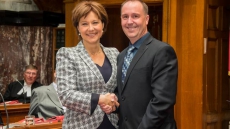Mary Jane Hill wasn't there to witness the birth of her grandchildren or to see them graduate from high school. She won't be there when her daughter needs her most, when she's in pain, or on her wedding day.
These are the losses Vicki Hill says she's suffered because of the death of her mother, whose naked body was found along British Columbia's Highway of Tears in 1978.
"I never knew her, but to me, in my eyes, she gave me life," Hill told the national inquiry into missing and murdered Indigenous women on Tuesday. "Now I have to live without her."
Hill was the first family member to testify at an inquiry hearing in Smithers, B.C., on Tuesday. She spoke softly and slowly, and her 15-year-old daughter, Zoey Hill-Harris, comforted her as tears rolled down her face.
She said she was only six months old when her mother died and has no memories of her. The murder was never solved and she has struggled to get information and documents from police, she said.
Hill read from a coroner's inquest report that concluded her 31-year-old mother died of bronchitis and pneumonia as a result of manslaughter. There was semen on her body and her clothes were discovered in an alley in Prince Rupert, 33 kilometres from where she was found dead, she said.
Dozens of women have died or gone missing along the stretch of Highway 16 between Prince Rupert and Prince George, which has become known as the Highway of Tears.
"I'm not only speaking for my mom, I'm speaking for the rest of the families. I feel their pain, I feel their hurt. I can see it. I'm not afraid," she said. "Things have got to change, no matter what."
Hill called on the commissioners to listen to families and bring them justice, adding she wants to see improved cellphone service and transportation along the Highway of Tears.
There is no cell service between Prince Rupert and Terrace, or in nearby Moricetown, she said, and she's never seen phone booths or emergency telephones, either.
A British Columbia inquiry into missing and murdered women recommended bus service along the route, but it took years for the service to arrive, and some buses have to be caught in the middle of the night, she said.
Vivian Tom, chief of the Wet'suwet'en First Nation in Burns Lake, also spoke Tuesday. Her powerful testimony about her 21-year-old daughter Destiny Tom brought several observers to tears.
Tom recalled forgiving and hugging her daughter's common-law partner and killer, Garrett George, who pleaded guilty to manslaughter and was sentenced to just over eight years in prison last November.
She also described a vision she had in church soon after her daughter's death. She saw her daughter's body, and she held her and rocked her in her arms, she said.
"I said, 'Destiny, I'm so sorry! I'm so sorry for what happened to you! I love you and I miss you. I'm so sorry that you were all alone when this happened,' " she said through sobs.
Tom said she then saw white wings sprout from her own shoulders and hands emerge from clouds above, then she flew with her daughter's body to place it gently in the hands.
When she had her daughter's tombstone made, she made sure it had angel wings on it, she added.
Tom and her husband are raising their granddaughter, Cassidy, who is now seven. She was six when she talked about committing suicide, she said.
"It just broke my heart," said Tom. "She figured that because the teenagers in our community attempted suicide ... she figured, death, suicide, then she could be with her mom.
"I sat her on my lap, I said, 'Baby girl, if you commit suicide, you can't be with mom, because mommy fought hard for every breath.' "
The inquiry has been plagued by controversy, with commissioner Marilyn Poitras resigning this summer and complaints from families about delays and poor communication.
Chief Commissioner Marion Buller said during opening remarks Tuesday that she and fellow commissioner Michele Audette will listen to families and survivors with open minds and open hearts.
Smithers is the first of nine communities the inquiry will visit this fall. The hearings runs through Thursday.





